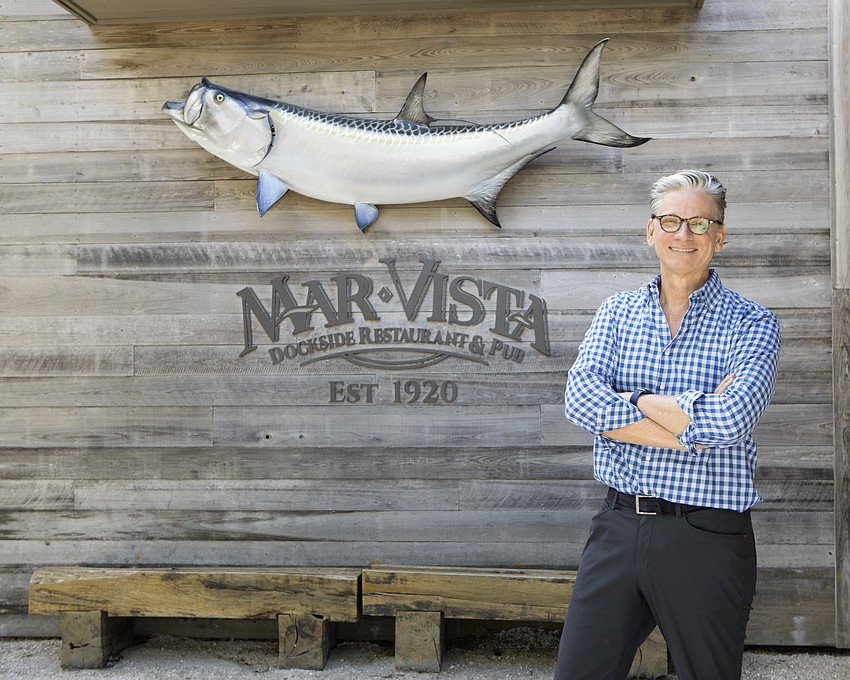Restaurant CEO's life, work lessons began in the Boy Scouts
Chuck Wolfe’s leadership foundation can be traced back to his days as a Boy Scout.
 Chuck Wolfe had a successful career in politics before getting into the hospitality industry.Photo by Mark Wemple
Chuck Wolfe had a successful career in politics before getting into the hospitality industry.Photo by Mark Wemple
Chuck Wolfe, celebrating five years at the helm of a noted waterfront restaurant brand this month, has one of the most unique leadership backgrounds of any executive in the region.
It ranges from rising to the highest ranks of the Boy Scouts of America organization as a young man to running massive political campaigns to helping turn around underperforming business. He’s worked for and with governors and senators. He’s overseen a hurricane relief program and an anti-tobacco and smoking campaign. And as CEO of the Victory Fund, a national Political Action Committee, he was on the front line of supporting LGBTQ candidates in elections nationwide for more than a decade.
And there’s this: Wolfe has been named to OUT Magazine’s list of 50 most Powerful LGBTQ Americans — twice.
Wolfe is currently CEO of Chiles Hospitality, an umbrella company that operates six brands. That includes the Sandbar, Beach House and Mar Vista Dockside Restaurant & Pub, a trio of eartiers on beachfront locations in Manatee County. Wolfe works alongside the company’s owner Ed Chiles, whose father, Lawton Chiles, was governor of Florida from 1991 to 1998. Elected to two terms, Chiles, a Democrat, died in office during his second term. He was 68 years old.
Wolfe, who grew up on the east coast of Florida, joined Chiles Hospitality in December 2018, when Ed Chiles looked to slow down a bit, but not retire. Wolfe came with a full plate of ideas to bolster operations, from launching a program to provide international student workers with housing to enhancing in-house training to improving employee benefits. The company has some 400 employees, and is ending the year on a high note, growth-wise, Wolfe says, after a slow period in early 2023. “The second half of the year was way better than the first,” Wolfe says.
A Scout's oath
Wolfe’s penchant for leadership, hospitality and top-notch customer service was clear in a conversation we had while munching on tater tots and other starters at Mar Vista one recent early afternoon Yet that’s only a taste of his other life and career successes. At each stop, Wolfe says he learned some key leadership lessons. That counts for both things he wanted to emulate — and things he sought to avoid.
One part of his career that stands out is what he did even before college: the Boy Scouts. Wolfe not only earned the top rank of Eagle Scout, but he went from South Florida to a national stage, being elected National Explorer President of the Boy Scouts of America in 1981. More than 40 years later, Wolfe’s life and times as a Scout — which included a meeting with Pres. Reagan in his national role — resonates.
“It was the first opportunity I had for leadership development,” he says. “It’s allowed me to excel in different fields (and) in different positions, all while staying with a moral code.”
The scouts, Wolfe says, is where he learned his love of the outdoors. It’s also where he learned how to budget his finances, when going to Publix to buy groceries for camping trips, and how to talk to adults. Wolfe even went to New York to take a Scouts-sponsored 10-day leadership class, where public speaking and service to others was on the docket.

Today, at 62 years old, Wolfe says he still has the Scout Oath and the 12 points of the Scout Law memorized. “It’s how I built character and became a good citizen,” he says. “Some things you learn as a young person have a big impact on your life.”
One more big lesson learned from Scouts came later in his life, when Wolfe advocated for an end to the Scouts’ discriminatory policies. In 2001, he appeared on CBS News’ “60 Minutes” in a segment titled “Boy Scouts: No Gays Allowed.”
Wolfe, reflecting back, says the entire Scouts experience taught him “skills that allow you to question things. There are some things you see, like secrecy and a lack of transparency, that you don’t adopt” as a leader.
Make work fun
While the BSA experience was impactful, it was also only the beginning of his career. Some other key leadership lessons Wolfe learned along his career path include:
Walking with Lawton
Wolfe held a number of high-profile positions under Gov. Chiles, the last Democrat to win a gubernatorial election in Florida. Among other posts, Wolfe oversaw the staff, volunteers, finances and operations at the Hurricane Andrew Relief Center outside Miami in 1992.
An important leadership lesson Wolfe learned from the governor — nicknamed Walkin’ Lawton after he walked 1,000 miles across Florida during a campaign in 1970 — was how to combine the science of listening with the art of compromise. “Lawtown was a great listener,” Wolfe says. “He was a politician so he had his point of view, but he had a way of listening to people on both sides so they walked away and thought they won.”
Stormy night
Another lesson came when Wolfe saw Chiles in action in the aftermath of Hurricane Andrew. “He wanted to show up and help but it wasn’t just a photo-op,” he says. “The empathy and compassion he showed is something I remember to this day. People want to see you as a leader, and want to know that you are helping people.”
Will to lead
Wolfe says when promoting or looking for leaders at Chiles Hospitality, a starting point is people “who embrace the hospitality spirit,” and are the visible, lead-by-example type. That goes back to his Boy Scout days, and seeing what separated the average Scouts from the high-performing ones. “I look for people who know how to avoid drama,” he says. “I want people who know how to diffuse difficult situations that can come up — either with employees or guests.”
Shift work
Wolfe has spent considerable time trying to make Chiles Hospitality a place where people don’t only have to work, but a place where they want to work. That’s not such an easy task in the fickle hospitality industry. “What really makes my stomach churn is if I come in in the morning and there’s been a problem the day before,” he says. “I get that it’s work, but it should be fun, too. We don’t want people to come to work and be in a really bad situation.”